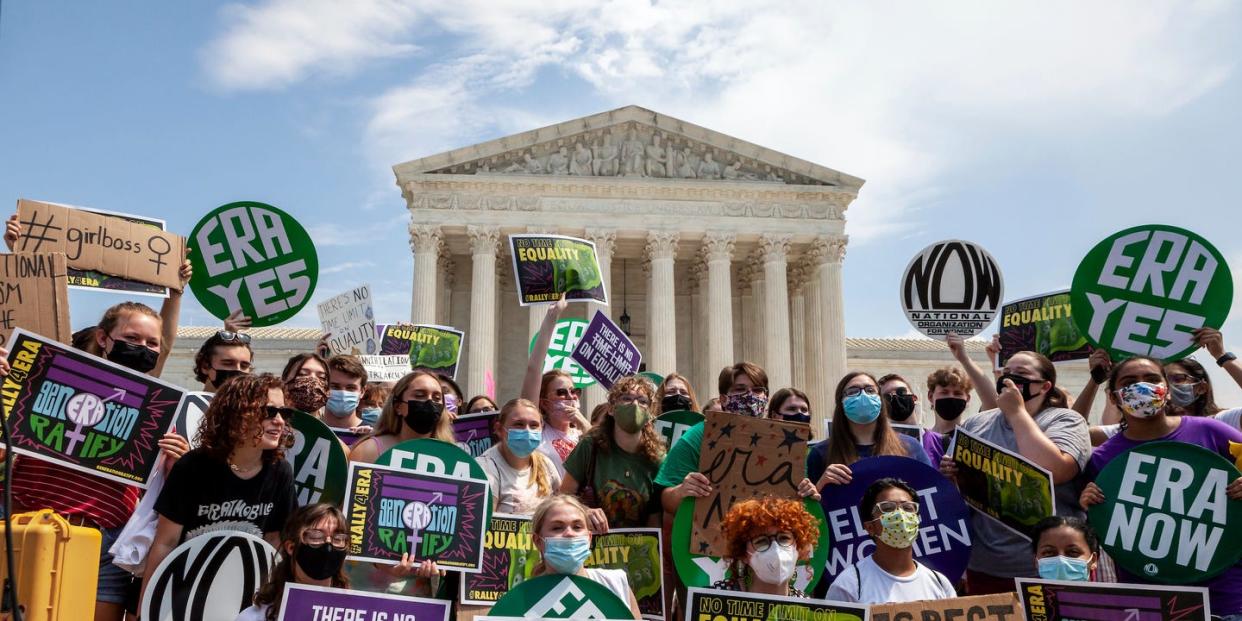Roe v. Wade Overturn Will Impact More Than Abortion Rights

- Oops!Something went wrong.Please try again later.
"Hearst Magazines and Yahoo may earn commission or revenue on some items through the links below."
Is Abortion a Right in the United States?
In the U.S. Constitution, there are rights enumerated in the text, and there are rights the Supreme Court has determined over time are implied by the document and context, reserved by the Ninth Amendment. The latter are called unenumerated rights, and they drive so-called constitutional “originalists” absolutely bonkers. Originalists think that only the things that were explicitly written down by the 42 men who drafted the Constitution in 1787 count. One particular unenumerated right—the right to privacy—really gets their goat. That’s because it’s what protects abortion access.
In a stunning and unprecedented leak yesterday, the draft of the majority opinion in the U.S. Supreme Court case Dobbs v. Jackson Women’s Reproductive Health, authored by George W. Bush appointee Justice Samuel Alito, indicates the intention of the court to explicitly overturn 50-year-old precedent Roe v. Wade, and demolish the right to privacy. In the draft opinion, Justice Alito goes after the fact that, no matter how many ctrl F searches you do, the word abortion does not appear in the Constitution. He bemoans, “Roe…was remarkably loose in its treatment of the constitutional text. It held that the abortion right, which is not mentioned in the Constitution, is part of a right to privacy, which is also not mentioned.”
But if it’s not in the constitution, when did the right to privacy first appear? In a case that preceded Roe called Griswold v. Connecticut, making birth control access a constitutional right. In 1965, U.S. Supreme Court Justice William O. Douglas wrote the opinion in Griswold. Douglas was a shameless philanderer. His womanizing was widely known, and until he had a stroke in 1974, according to his biographer, he “chased—and often caught—anything in a skirt that appealed to him.” At the time he wrote the majority opinion in Griswold, he was 67 years old and having an affair with a 22-year-old student.
Perhaps motivated by his extrajudicial activities, he was committed to finding a right to access birth control in the U.S. Constitution, come hell or high water. Problem was: The word contraceptive was nowhere to be found in the relatively short document, not having been a primary concern of those 42 men in 1787. Undeterred, Justice Douglas, or “Wild Bill,” as many called him, pulled a savvy move finding a new right—the right to privacy—in the Constitution. Borrowing a scientific term derived from how the light of the sun interacts with the moon and earth, he decided that the right to birth control existed in the “penumbras,” or outer regions of the shadows of the law.
Those penumbras have been driving conservative justices crazy ever since, legalizing not only abortion but also same-sex relationships, in the case Lawrence v. Texas.
Griswold v. Connecticut
However, the amici in the Griswold case argued based on equality, not privacy. With the Equal Rights Amendment (ERA) unratified, equality was nowhere to be found. And because gender equality has not yet been formalized into the Constitution—through certification and publication of the ERA—it is now being completely erased. The right to privacy that Justice Douglas articulated, which was later used to secure the constitutional right to access abortion in Roe v. Wade, is now being completely demolished before our very eyes. With this leaked draft opinion, we do not have to speculate; we can see it plainly. Of course, abortion is not the only unenumerated right on the chopping block. The death of Roe will cause an intentional domino effect on all the rights found in the structure, not the text, of the Constitution: access to contraceptives (Griswold), legal LGTBQ relationships (Lawrence), same-sex marriage (Obergefell v. Hodges), and interracial marriage (Loving v. Virginia), in addition to abortion rights.
It is not easy to change the U.S. Constitution. In fact, it’s so difficult, it’s only been done 27 times in our nation’s history. But Wild Bill tried a hack, and it’s no longer working.
What the Supreme Court Overturn Would Mean
If this Supreme Court goes ahead, as planned, and completely abolishes the constitutional right to access abortion, they will lose all legitimacy. Women are going to continue having abortions—legal or not. In the immediate aftermath of the fall of Roe in June, everyone must: Start sharing information about the safety and availability of abortion pills, support local abortion funds to help people get the care they need, and buoy up independent abortion clinics, which provide most care later in pregnancy and will be completely overwhelmed with out-of-state patients. But in addition to emergency measures, we need a permanent fix. In order to secure the right to abortion into the bedrock of our most foundational document, and establish gender equality as an American value, we must finalize and publish the ERA.
Alito’s leaked draft opinion is shocking but not surprising. Far-right, anti-abortion extremists have long been clear that their stated goal is to completely overturn Roe. Our response to this illegitimate attack on our fundamental human rights must be equally methodical and comprehensive. We must let this decision radicalize us, rather than lead us to despair. We must change the very document the justices are charged with interpreting and enumerate equality, once and for all.
__________________________________________________________________________
Kate Kelly is an attorney and author of Ordinary Equality: The Fearless Women and Queer People Who Shaped the U.S. Constitution and the Equal Rights Amendment.
You Might Also Like

